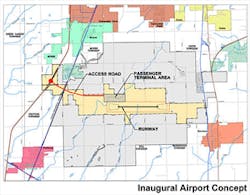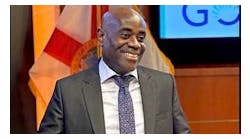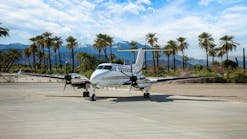CHICAGO (AP) -- State officials see a gold mine in the cornfields 40 miles south of downtown Chicago: a commercial airport that would inject thousands of new jobs into the economically depressed south suburbs and help unclog the skies over O'Hare International Airport.
While there has been talk of a third Chicago-area airport for almost 20 years, the latest plan has taken wing thanks to private money and the support of Congressman Jesse Jackson Jr. and Gov. Rod Blagojevich. Blagojevich late last month gave federal aviation officials a blueprint for a single-runway, five-gate airport near the small town of Peotone.
Many aviation experts, however, are skeptical the airport would draw the interest of airlines or passengers. They point to other small airports - some closer to the Chicago than Peotone, such as one in Gary, Ind. - that have tried in vain for years to steal passengers away from busy O'Hare and Midway airports.
''If there's such a huge demand for a new airport, why aren't airlines and passengers flocking to Gary or Rockford?'' asked Denver-based airline consultant Michael Boyd.
Boyd says he sees parallels between the Peotone proposal and MidAmerica Airport, 20 miles east of St. Louis in Mascoutah, Ill., which has been a colossal bust since it opened in 1997. It drew just 7,800 passengers last year despite original forecasts of more than a million by 2005.
Even so, many observers say an airport at Peotone has a good shot at getting built for one reason: political will.
The resurgence of the third airport concept is credited largely to boosterism from Jackson, who has made it his pet project for a decade. It got another boost in January, when Blagojevich endorsed Jackson's airport plan in his State of the State address.
Jackson touts Peotone as the nation's first privately funded airport; two developers last year pledged $200 million to open it. He says the airport, which eventually would expand to four runways and 12 gates, would be tailor-made for discount carriers such as JetBlue.
''It's the fastest, cheapest and safest way to address Chicago's aviation capacity crisis,'' said Jackson, who represents Chicago's south suburbs.
Most state and federal lawmakers who represent the area want the airport, although a political battle is simmering over what entity would control it: Jackson's coalition of 32 south suburban municipalities or the government of Will County.
Chicago Mayor Richard Daley, long thought to oppose a third airport over fears it could pose a threat to Midway and a proposed $15 billion expansion of O'Hare, has expressed indifference about Peotone lately.
''Go ahead and build it,'' Daley said at a recent news conference.
But whether the airport will fly with the public is up for debate.
''I don't believe we're anywhere near the point of needing another major facility for the Chicago area,'' said Aaron Gellman, a professor at Northwestern University's Transportation Center. ''It's politically driven.''
Analysts point to the growth in traffic at O'Hare and Midway as proof that passengers aren't interested in an alternative. Takeoffs and landings at O'Hare have increased since 2000, to 968,000 last year. Flights at Midway are up 24 percent over that period, to 280,000.
And smaller airports are positioning themselves to capitalize now on the congestion, which could mean competition for a future airport at Peotone.
''There is a third airport. It's in Gary,'' said Paul Karas, manager of Gary/Chicago International Airport. The facility, 15 miles closer to downtown Chicago than Peotone, received federal approval in March for a $90 million expansion.
Greater Rockford Airport, about 85 miles northwest of Chicago, has begun offering twice daily service to Detroit on Northwest Airlines.
Even General Mitchell International Airport in Milwaukee has marketed itself as ''Chicago's Third Airport'' for years. It's making a stronger pitch with a new Amtrak station that receives seven trains daily from Chicago.
While the FAA has agreed with the state's projection of nearly 14,000 flights a year at Peotone within six years of its projected opening in 2009, many Illinois business and political leaders say the only real solution for Chicago's clogged aviation system is expanding O'Hare.
''We need to fix O'Hare at O'Hare,'' said FAA spokesman Tony Molinaro.
The O'Hare expansion is a huge, controversial proposal for an airport that logged the worst on-time performance in the nation last year. The plan would add two new runways, reconfigure others and build new terminals. It is still under FAA consideration, but Molinaro said the FAA decision, due in September, will have no bearing on its eventual decision on Peotone.
Regardless, the city's chronically congested skies can only bode well for Peotone's future, says Joseph Schwieterman, an aviation expert at DePaul University.
''Our air-travel system is splitting at the seams,'' he says. ''That makes the outlook much more favorable for a scaled-down airport like Peotone.''





